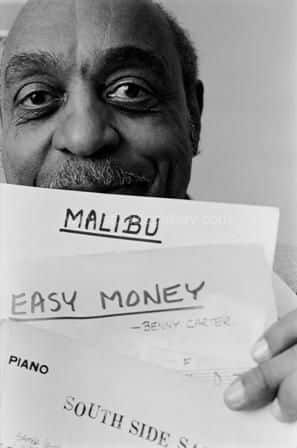Deborah Feingold Signed Photograph Of Jazz Man Benny Carter 1981
£395.00
Date: Published Sept 2008
Signed By: Deborah Feingold in Pencil
Edition: 21 Prints Available World Wide
Atelier: Dekkel Fine Art Publishing
Condition: New – mint condition
Medium: Archival Giclee On 300gsm Fine Art Pape
Description
Bennett Lester Carter (August 8, 1907 – July 12, 2003) was
an American jazz alto saxophonist, clarinetist, trumpeter,
composer, arranger, and bandleader.
He was a major figure in jazz from the 1930s to the 1990s,
and was recognized as such by other jazz musicians who
called him King (coined by Ben Webster).
In 1958, performed with Billie Holiday at the legendary
Monterey Jazz Festival.
The National Endowment for the Arts honored Benny Carter
with its highest honor in jazz, the NEA Jazz Masters Award
for 1986.
He was awarded the Grammy Lifetime Achievement Award in
1987, winner of the Grammy Award in 1994 for his solo
“Prelude to a Kiss”, and also the same year, received a star
on the Hollywood Walk of Fame.
In 2000 awarded the National Endowment for the Arts,
National Medal of Arts, presented by President Bill Clinton.
He first recorded in 1928 with Charlie Johnson’s Orchestra,
also arranging the titles recorded, and formed his first big
band the following year. He played with Fletcher Henderson
in 1930 and 1931, becoming his chief arranger in this time,
then briefly led the Detroit-based McKinney’s Cotton
Pickersbefore returning to New York in 1932 to lead his own
band in early swing arranging, include such swing stars as
Leon “Chu” Berry (tenor saxophone), Teddy Wilson (piano),
Sid Catlett (drums), and Dicky Wells (trombone). They were
sophisticated and very complex arrangements, and a number of
them became swing standards which were performed by other
bands (“Blue Lou” is a great example of this). He also
arranged for Duke Ellington during these years. Carter was
most noted for his superb arrangements. Among the most
significant are “Keep a Song in Your Soul”, written for
Fletcher Henderson in 1930, and “Lonesome Nights” and
“Symphony in Riffs” from 1933, both of which show Carter’s
fluid writing for saxophones.By the early 1930s he and
Johnny Hodges were considered the leading alto players of
the day. Carter also quickly became a leading trumpet
soloist, having rediscovered the instrument. He recorded
extensively on trumpet in the 1930s. Carter’s name first
appeared on records with a 1932 Crown label release of “Tell
All Your Day Dreams to Me” credited to Bennie Carter and his
Harlemites. Carter’s short-lived Orchestra played the Harlem
Club in New York but only recorded a handful of brilliant
records for Columbia, OKeh and Vocalion.


Reviews
There are no reviews yet.